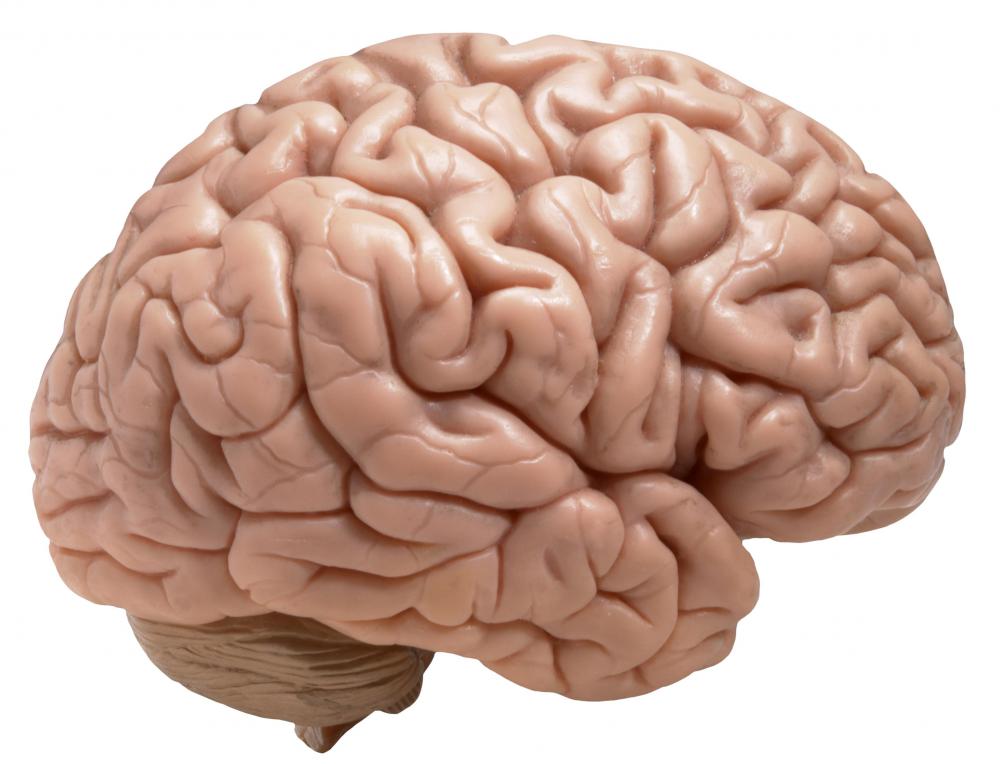At WiseGEEK, we're committed to delivering accurate, trustworthy information. Our expert-authored content is rigorously fact-checked and sourced from credible authorities. Discover how we uphold the highest standards in providing you with reliable knowledge.
What is Antipsychotic Medication?
Antipsychotic medication is a class of psychiatric drugs that is used to treat symptoms of psychosis. They are prescribed for mental illnesses like schizophrenia and bipolar disorder. Antipsychotic drugs, also known as major tranquilizers, work to lessen delusional thought, hallucinations and psychomotor excitement. Though the medications cannot cure mental illnesses, they can mitigate the symptoms.
Psychotic symptoms are thought to be, in part, a result of too much dopamine being released in the mesolimbic pathway, the area of the brain responsible for regulating response to stimuli that instigate feelings of reinforcement and reward. Antipsychotic medication works to block dopamine receptors in this pathway. The drugs can block receptors in other pathways as well, which can result in undesirable side effects.

Dosing for antipsychotic medication depends on the individual patient. The health care provider must balance the benefits of the medication with the possible side effects, and these factors vary from person to person. Considerations include a patient's body weight, age and the severity of his or her illness.
The earliest antipsychotic drugs, often called typical antipsychotics, have been around since the 1950s. They include haloperidol, perphenazine and chlorpromazine. Though these medications are effective in treating symptoms of psychosis, side effects can manifest that adversely affect a person's body movements. These include rigidity, restlessness and muscle spasms.

In the 1990s, second generation antipsychotic medications, sometimes referred to as atypical antipsychotics, became available. Patients who take the second generation drugs tend to experience fewer movement-related side effects. Clozapine is a particularly effective atypical antipsychotic in its efficacy against psychotic symptoms, but it sometimes results in a serious problem whereby a person loses white blood cells that are crucial in battling infection. Other atypical antipsychotics are available that do not cause this problem.

All antipsychotic medication, whether first or second generation, have many associated side effects. The drugs affect patients' metabolisms, sometimes resulting in significant weight gain. Patients who take antipsychotics must be regularly checked for high cholesterol and symptoms of diabetes. Other side effects of antipsychotics include dizziness, lethargy and blurry vision.
Medical professionals prescribe antipsychotic medications in liquid, pill or injectable form. The time required for antipsychotic drugs to work ranges from a few days to several weeks, depending on the medication and the individual patient. Withdrawal symptoms from antipsychotic medications are significant and can include insomnia, anxiety and psychosis. Once taking antipsychotic medication, a patient should not cease taking it without discussing the matter with his or her doctor.
AS FEATURED ON:
AS FEATURED ON:













Discussion Comments
So often schizophrenia medication, or bipolar medication is used as a way of introducing more tension into a TV show or movie.
What will generally happen is that the character with the mental illness will be put on the medication and will immediately calm right down (in reality people usually need months before they really start to feel the effects of the medicine).
They will then continue for a short while, thinking life is great before realizing that they have lost their "spark", whether that is a creative spark or a spark with a partner or whatever.
So, they will go off the drugs and the whole thing will happen over again.
Really, in real life, if you feel like your medication isn't helping or is stopping you from living your life in some way, tell you doctor. Don't just go off the medication. There are many different combinations to try and, while there is no guarantee that you'll find a perfect one, most people find something they can live with. Don't take the all or nothing attitude that gets thrown around on TV.
@indigomoth - It's more complicated, you're right. We are made up of chemicals but I would argue that even if your medications changed the way we filter the world, it would not necessarily change personality.
I'm one of those people who thinks that nature is a stronger force than nurture. Even if medication can calm you down and stop you from experiencing things that aren't there, your reactions to those things and to ordinary things will remain the same.
A good person with schizophrenia seems like a "bad person" because they are horribly stressed out from all the things they think keep happening to them. The medication removes the cause of the stress. I don't believe it really changes the core of the person themselves.
I find it so interesting that what seems like a huge part of a person's life can be manipulated so readily by medication.
I mean, people who have mental illness don't feel like their thoughts are any different from you feel your thoughts are. If their thoughts can be manipulated by medications it means yours can be as well.
I'm not trying to be creepy or anything, I just think it is really interesting that so much of what we think of as more to do with a personality or a soul is actually chemical. That with a few tweaks of it, you might become a completely different person.
Of course they don't exactly have it all worked out because it's far more complicated than that, but it's still something to think about.
Post your comments